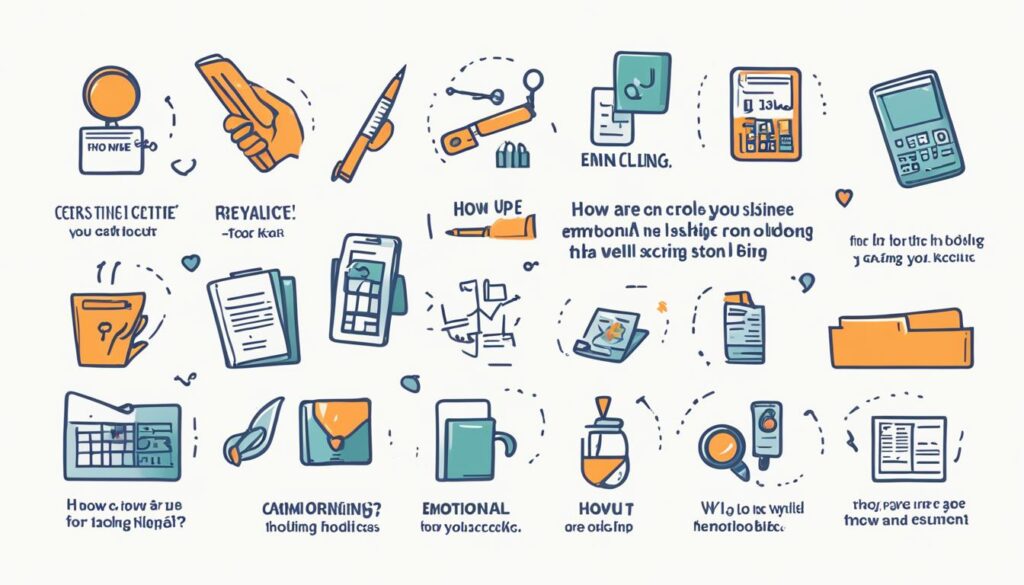Sometimes, the simple question “how are you holding up?” doesn’t quite capture the depth of emotions that someone may be experiencing. As we navigate through life’s ups and downs, it’s important to check in on our loved ones and truly understand how they are doing emotionally. In this article, we’ll explore alternative ways to ask about someone’s well-being, going beyond the surface-level response of “fine” or “good.”
Asking the right questions can create a safe space where genuine conversations about emotional well-being can take place. By using alternative phrases, we can connect on a deeper level and show our loved ones that we truly care. Whether it’s using light check-in questions, probing questions, sincere check-in questions, or even playful check-in questions, there are various approaches we can take to foster meaningful discussions about emotional well-being.
Key Takeaways:
- Asking “how are you holding up?” may not always elicit genuine responses about someone’s emotional state.
- Light check-in questions create a safe space for someone to share their experiences and feelings without feeling pressured.
- Probing questions encourage deeper reflection on someone’s inner thoughts and concerns.
- Sincere check-in questions convey a genuine desire to hear someone’s true feelings.
- Creative and playful check-in questions add a lighthearted touch to the conversation while still allowing for emotional expression.
Why Asking “How Are You” Doesn’t Always Work
The traditional question “how are you?” is often used as a simple greeting, but it doesn’t always elicit genuine responses about someone’s emotional state. People tend to default to socially acceptable answers like “fine” or “good” instead of sharing their true feelings. In order to truly check in on someone’s mental health, we need to go beyond this common question and create a safe space for open and honest conversations.
I think sometimes we ask “how are you” out of habit, without really expecting or ready to hear the depths of someone’s emotions. We need to be prepared to listen compassionately and without judgment.
When we ask a generic question, we’re often met with generic responses that don’t provide a true insight into someone’s well-being. It’s essential to remember that mental health is complex and deeply personal. Here are a few reasons why asking “how are you?” may not always work:
- Social Expectations: Society has conditioned us to reply with automatic responses like “I’m fine” or “I’m good.” This can make it challenging for individuals to express their true emotions, especially if they’re struggling.
- Fear of Vulnerability: Opening up about one’s mental health requires vulnerability. Some people may fear being judged, stigmatized, or dismissed, which may prevent them from sharing their true feelings or seeking support.
- Lack of Trust: Building trust is crucial when discussing sensitive topics like mental health. If someone doesn’t feel comfortable or trust the person asking the question, they may hesitate to share their true emotions or struggles.
- Shallow Interactions: Asking “how are you?” has become a mere formality in many conversations. It’s often used as a quick greeting rather than a genuine inquiry into someone’s well-being.
It’s important to recognize that mental health and emotional well-being require deeper conversations and genuine care. By understanding why asking “how are you?” may fall short, we can make more intentional efforts to check in on someone’s mental health and create an environment where they feel comfortable opening up.
Light Check-In Questions
Inquiring about someone’s emotional well-being doesn’t always have to be an overwhelming experience. Light check-in questions provide a gentle approach to connect with your loved ones on a deeper level. By asking more specific questions about their day, you can create a safe space for them to open up without feeling pressured.
Here are some alternative phrases to ask how someone is doing emotionally:
- How was your morning?
- What’s something you enjoyed about your day?
- What brought you joy today?
“How was your morning?”
Asking about their morning gives the person an opportunity to reflect on the beginning of their day. It encourages them to share any positive experiences that may have shaped their emotional well-being.
“What’s something you enjoyed about your day?”
This question allows the person to focus on the positive aspects of their day, highlighting moments that brought them joy or satisfaction. It opens the door for them to express their emotional state in a lighter, less intimidating way.
By using these light check-in questions, you create a more relaxed atmosphere for discussing emotional well-being. It shows your genuine interest in their experiences and provides an opportunity for heartfelt conversations.
Remember, the key to successful check-ins is to listen attentively and respond with empathy. Let your loved ones know that you truly care about their emotional well-being.
Probing Questions
If you want to delve deeper into someone’s emotional well-being, asking probing questions is an effective approach. These questions encourage individuals to reflect on their thoughts and feelings, providing you with valuable insights into their emotional state. By demonstrating your genuine interest, you create a safe space for them to share. Here are a few examples of probing questions to help assess someone’s emotional state and inquire about their well-being:
- “What’s on your mind today?”
- “What’s an unresolved conundrum that you keep going back to?”
With these probing questions, you invite the person to open up and share their inner thoughts and concerns. The answers to these questions can help you better understand their emotional well-being and provide the support they may need.
The Power of Probing
“The questions we ask reflect our desire to know, to understand, and to connect on a deeper level. By asking probing questions, we create an opportunity for others to express themselves authentically. As we listen attentively to their responses, we unlock a world of emotions, thoughts, and experiences that strengthen our bonds and pave the way for greater empathy and understanding.”
| Probing Questions | Benefits |
|---|---|
| What’s on your mind today? | Encourages introspection and self-reflection |
| What’s an unresolved conundrum that you keep going back to? | Allows for discussion of deeper concerns and challenges |
| How are you coping with the recent changes in your life? | Provides an opportunity for expressing emotions and adjusting perspective |
Using probing questions requires sensitivity and emotional intelligence. Remember to provide a supportive environment and actively listen to their responses, allowing them to feel heard and understood.
Sincere Check-In Questions
There are moments when a simple and sincere check-in question can work wonders in encouraging someone to open up about their emotional well-being. It’s in these instances that I find myself asking heartfelt questions like:
- “So, how are you… really?”
- “How’s your heart today?”
These questions go beyond the surface level and convey my genuine desire to understand the true feelings and emotions of the person I’m speaking with. By pausing, making eye contact, and giving them the space to respond honestly, I create an environment of trust and support where they feel safe to share their innermost thoughts. It’s a powerful way to let them know that I’m there for them.
“How are you holding up?”
This is the most common question we ask when checking on someone’s emotional well-being. But sometimes, it’s the straightforward and sincere check-in questions that truly make a difference in someone’s life. These heartfelt questions show that you genuinely care about how they’re coping and create a space for them to open up.”
Creative and Playful Check-In Questions
In the delicate dance of emotional connection, playfulness and creativity can be the key to unlocking the hidden chambers of the heart. When words tumble together in delightful harmony, they can bridge the gaps that divide us. So, behold! Let us venture into the realm of whimsical check-in questions, where laughter perches upon the branches of conversation.
To lighten the mood and foster a bond that transcends the ordinary, indulge in moments of mirth and curiosity. Discover alternative ways to inquire, for bright waves of creativity can wash away the worries that often weigh heavy upon the soul. Speak in riddles and giggle at the delightful absurdity. Explore playful questions that unlock the Pandora’s box of one’s emotional state.
Delve into the realm of imagination and let your curiosity be the compass that guides your inquiries. Instead of asking the usual, why not venture down the path less traveled? Pose questions like “What’s the good word, my dear soul?” or “Pray tell, what’s the latest buzz in your world?” Not only will these questions bring a smile to the lips, but they also open the gates of heartfelt conversation.
Embrace the power of playfulness, for it invites vulnerability and encourages one to share their emotional state in gentler, more whimsical tones. By anchoring the conversation in lightheartedness, we create a sanctuary where truth can be unveiled without fear or hesitation. Through creative check-in questions, we paint a canvas of connection, inviting colors to dance upon the palette of conversation.
| Check-In Question | Description |
|---|---|
| What’s the good word, my dear soul? | A playful invitation to share both the ups and downs of life. |
| Pray tell, what’s the latest buzz in your world? | An enchanting query that sparks curiosity and welcomes stories. |
| Do you have a secret smile tucked away today? | A whimsical way to inquire about the person’s hidden joys or happiness. |
| If emotions were flavors, what would be the taste of your heart right now? | A poetic prompt that encourages the person to explore their emotional landscape through the senses. |
| What adventures has your heart been seeking lately? | A spirited question that invites the person to share their desires and dreams. |
Formal Check-In Questions
In certain formal settings, such as professional or business interactions, it’s important to use more formal check-in questions. Instead of the casual “how are you holding up?”, consider using phrases that maintain a sense of courtesy while still showing genuine concern for the other person’s emotional state.
“How have you been getting on?”
This formal check-in question conveys your interest in the person’s well-being without being overly personal. It allows them to open up if they choose to, while still respecting their boundaries in a professional context.
Another formal option is to use the age-old phrase “how do you do?”. Although commonly used as a greeting, it can also be interpreted as a polite inquiry about someone’s current state.
“How do you do?”
Remember, in formal settings, it’s essential to be mindful of professionalism while expressing concern for someone’s emotional state. These formal check-in questions create a respectful environment while showing that you genuinely care about their well-being.
Comparison of Formal Check-In Questions
| Check-In Question | Context |
|---|---|
| “How have you been getting on?” | Professional or business interactions |
| “How do you do?” | Formal settings, general interactions |
Responding to Check-In Questions
When someone asks you a check-in question, it’s important to respond sincerely and genuinely. Your response can provide insight into your emotional well-being and allow others to offer support when needed. Here are some ways to effectively answer the question “how are you?” in English:
1. Keep it simple and positive
If you’re feeling fine, a straightforward response like “no, I’m fine” or “no problems” can suffice. These short, positive answers convey that you’re doing well without going into too much detail. Remember, brevity can be powerful.
2. Share your current state
If you’re not feeling your best, it’s okay to explain your symptoms using simple phrases. For example, you can say “I have a cold” or “I’m just a bit tired.” By sharing this information, you let others know that you may not be at your peak, opening the door for understanding and support.
3. Gauge the tone and share appropriately
Pay attention to the tone of the check-in question. If someone asks with genuine concern, you can feel more comfortable sharing a bit more about how you’re really feeling. Use your judgment and share as much or as little as you feel comfortable with.
Remember, responding to check-in questions isn’t just about giving a robotic answer. It’s an opportunity to be genuine and create a deeper connection with others.
“A sincere response to a check-in question can spark meaningful conversations, build trust, and foster supportive relationships.” – Anonymous
| Question | Possible Responses |
|---|---|
| How are you holding up? | “No, I’m fine” “No problems” |
| How do you feel today? | “I have a cold” “I’m just a bit tired” |
| What’s been going on? | “I’ve been feeling a bit overwhelmed lately” “I’ve had a lot on my plate, but I’m managing” |
Use Careful Phrases
When expressing concern about someone’s condition, it’s essential to choose your words carefully and avoid phrases that may unintentionally offend or upset them. Remember, our words have the power to comfort and uplift, so it’s important to use them wisely.
Instead of saying:
“You look a bit under the weather.”
Consider saying:
“How are you feeling today?”
Instead of saying:
“You don’t look so good.”
Consider saying:
“Is there anything I can do to support you?”
Instead of saying:
“He/she doesn’t sound good.”
Consider saying:
“I noticed you seem a bit down. Is everything okay?”
By using phrases that convey genuine concern and empathy, we can create an atmosphere of care and understanding. Being mindful of the impact our words can have on someone’s well-being shows that we value their feelings and are truly interested in their condition.
Choose Words that Inspire Comfort
When selecting the right words, it’s important to prioritize comfort over curiosity. Instead of probing for specific details or medical explanations, focus on providing support and reassurance. Here are a few examples of comforting phrases:
- “I’m here for you.”
- “You’re not alone in this.”
- “How can I help you through this?”
- “I care about your well-being.”
- “You are strong, and I believe in you.”
By choosing words that inspire comfort and empathy, we can create an environment where individuals feel safe to share their emotions and experiences openly.
The Power of Empathy
In times of emotional vulnerability, the power of empathy cannot be overstated. When we engage in genuine and compassionate conversations, we create space for others to express their feelings without judgment. By actively listening to their concerns and responding with empathy, we promote healing and provide much-needed support.
Remember, asking about someone’s condition is an act of care and kindness. Use phrases that encourage open communication and demonstrate your sincerest intentions. Your words have the power to make a positive impact on someone’s emotional well-being.
Conclusion
As I conclude this exploration of alternative ways to ask ‘how are you holding up?’, I am reminded of the importance of inquiring about someone’s emotional well-being. It is through these thoughtful conversations that we build and nurture strong relationships. By using alternative phrases and check-in questions, we create a safe and supportive space for our loved ones to share their true feelings.
Whether we choose light check-in questions to create a relaxed atmosphere, probing questions to delve deeper into their emotional state, sincere check-in questions to encourage genuine responses, or playful check-in questions to bring a touch of liveliness, the key remains the same – truly listening and demonstrating our care.
So, let us engage in conversations that go beyond the surface, and let us ask our loved ones about their well-being in heartfelt and meaningful ways. Together, we can foster emotional connections, provide support, and promote stronger emotional well-being in our relationships.
FAQ
Why is asking “how are you” not always effective in checking on someone’s emotional state?
The traditional question “how are you?” is often used as a simple greeting and may not elicit genuine responses about someone’s emotional well-being. People tend to give socially acceptable answers like “fine” or “good” instead of sharing their true feelings.
What are some light check-in questions I can ask to inquire about someone’s well-being?
Some light check-in questions include “how was your morning/afternoon/evening?” or “what’s something you liked about your day?”. These questions create a safe space for the person to open up without feeling pressured.
What are probing questions and how can they help assess someone’s emotional state?
Probing questions encourage the person to share their thoughts and feelings. Examples include “what’s on your mind today?” or “what’s an unresolved conundrum that you keep going back to?”. These questions demonstrate genuine interest and create an opportunity for the person to express themselves.
What are sincere check-in questions and why are they important?
Sincere check-in questions, like “so how are you, …really?” or “how’s your heart today?”, create an environment of trust and support. Pausing, making eye contact, and giving the person space to respond honestly shows that you genuinely care about their emotional well-being.
How can creative and playful check-in questions foster a sense of connection?
Creative check-in questions, such as “what’s the good word?” or “what’s the latest buzz in your world?”, add a lighthearted touch while still allowing the person to share their emotional state. These questions can help create a sense of connection and lighten the mood.
What are some formal check-in questions that can be used in professional settings?
In professional or business interactions, phrases like “how have you been getting on?” or “how do you do?” can be used to inquire about someone’s well-being. These formal check-in questions maintain courtesy while showing concern for the person’s emotional state.
How should I respond to check-in questions?
It’s important to respond sincerely and genuinely. If you’re feeling fine, you can simply say “no, I’m fine” or “no problems.” If you’re not feeling well, you can explain your symptoms using phrases like “I have a cold” or “I’m just a bit tired.” Share as much or as little as you feel comfortable with.
What phrases should I use carefully when asking about someone’s condition?
Expressions like “you look a bit under the weather,” “you don’t look so good,” or “he/she doesn’t sound good” should be used with caution. They can be perceived as offensive if used without proper context or a close relationship with the person. Choose your words carefully and be mindful of the other person’s feelings.
Why is it important to inquire about someone’s emotional well-being?
Inquiring about someone’s emotional well-being is crucial for maintaining strong relationships. Using alternative phrases and check-in questions creates a safe and supportive space for loved ones to share their true feelings. Genuine listening and showing that you care are key elements in checking on someone’s emotional well-being.
Source Links
- https://weshouldgettogether.com/blog/4-different-ways-to-ask-how-are-you-feeling
- https://7esl.com/how-are-you/
- https://www.englishclass101.com/lesson/english-grammar-made-easy-101-how-to-ask-about-someones-health-are-you-sick-not-meaning-crazy?lp=172















